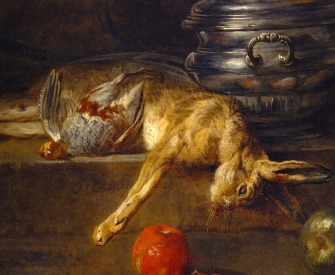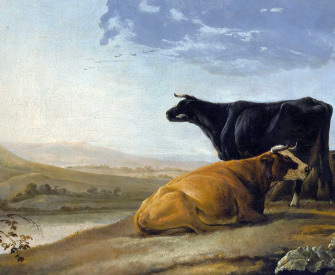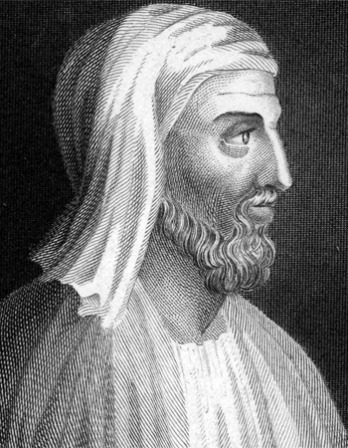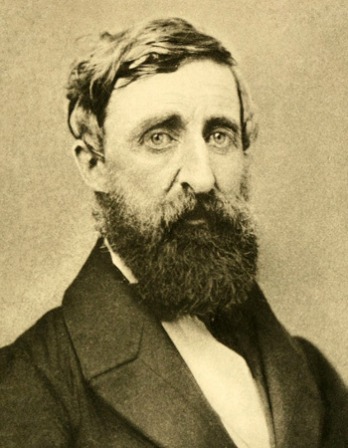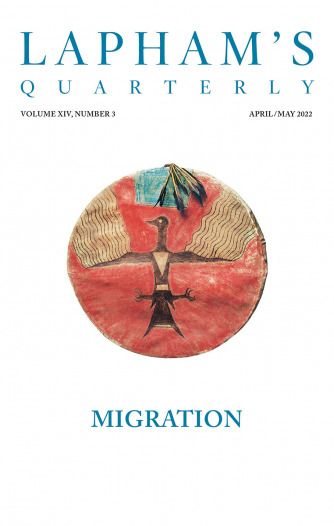And so, numbering off my band of men at arms
into two platoons, I assigned them each a leader:
I took one and lord Eurylochus the other.
We quickly shook lots in a bronze helmet—
the lot of brave Eurylochus leapt out first.
So he moved off with his two and twenty comrades,
weeping, leaving us behind in tears as well…
Deep in the wooded glens they came on Circe’s palace
built of dressed stone on a cleared rise of land.
Mountain wolves and lions were roaming round the grounds—
she’d bewitched them herself, she gave them magic drugs.
But they wouldn’t attack my men; they just came pawing
up around them, fawning, swishing their long tails—
eager as hounds that fawn around their master,
coming home from a feast,
who always brings back scraps to calm them down.
So they came nuzzling round my men—lions, wolves
with big powerful claws—and the men cringed in fear
at sight of those strange, ferocious beasts…But still
they paused at her doors, the nymph with lovely braids,
Circe—and deep inside they heard her singing, lifting
her spellbinding voice as she glided back and forth
at her great immortal loom, her enchanting web
a shimmering glory only goddesses can weave.
Polites, captain of armies, took command,
the closest, most devoted man I had: “Friends,
there’s someone inside, plying a great loom,
and how she sings—enthralling!
The whole house is echoing to her song.
Goddess or woman—let’s call out to her now!”
So he urged and the men called and hailed her.
She opened her gleaming doors at once and stepped forth,
inviting them all in, and in they went, all innocence.
Only Eurylochus stayed behind—he sensed a trap…
She ushered them in to sit on high-backed chairs,
then she mixed them a potion—cheese, barley,
and pale honey mulled in Pramnian wine—
but into the brew she stirred her wicked drugs
to wipe from their memories any thought of home.
Once they’d drained the bowls she filled, suddenly
she struck with her wand, drove them into her pigsties,
all of them bristling into swine—with grunts,
snouts—even their bodies, yes, and only
the men’s minds stayed steadfast as before.
So off they went to their pens, sobbing, squealing
as Circe flung them acorns, cornel nuts, and mast,
common fodder for hogs that root and roll in mud.
Back Eurylochus ran to our swift black ship
to tell the disaster our poor friends had faced.
But try as he might, he couldn’t get a word out.
Numbing sorrow had stunned the man to silence—
tears welled in his eyes, his heart possessed by grief.
We assailed him with questions—all at our wits’ end—
till at last he could recount the fate our friends had met:
“Off we went through the brush, captain, as you commanded.
Deep in the wooded glens we came on Circe’s palace
built of dressed stone on a cleared rise of land.
Someone inside was plying a great loom,
and how she sang—in a high clear voice!
Goddess or woman—we called out and hailed her…
She opened her gleaming doors at once and stepped forth,
inviting us all in, and in we went, all innocence.
But I stayed behind—I sensed a trap. Suddenly
all vanished—blotted out—not one face showed again,
though I sat there keeping watch a good long time.”
At that report I slung the hefty bronze blade
of my silver-studded sword around my shoulder,
slung my bow on too and told our comrade,
“Lead me back by the same way that you came.”
But he flung both arms around my knees and pleaded,
begging me with his tears and winging words;
“Don’t force me back there, captain, king—
leave me here on the spot.
You will never return yourself, I swear,
you’ll never bring back a single man alive.
Quick, cut and run with the rest of us here—
we can still escape the fatal day!”
© 2004 Hackett Publishing Company, Inc. Used with permission of Hackett Publishing Company, Inc. All rights reserved.
From The Odyssey. Odysseus obtains an herb that makes him impervious to Circe’s potion. “You have a mind in you no magic can enchant,” she exclaims, and invites him to bed. “Not for all the world,” he replies, making her pledge that she will do him no harm; then he proceeds to mount her “gorgeous bed.” Afterward, he demands she reverse the effects on his men. It is believed that considerable portions of the 15,693 lines in The Iliad and the 12,110 lines in The Odyssey were memorized by individual rhapsodes.
Back to Issue

